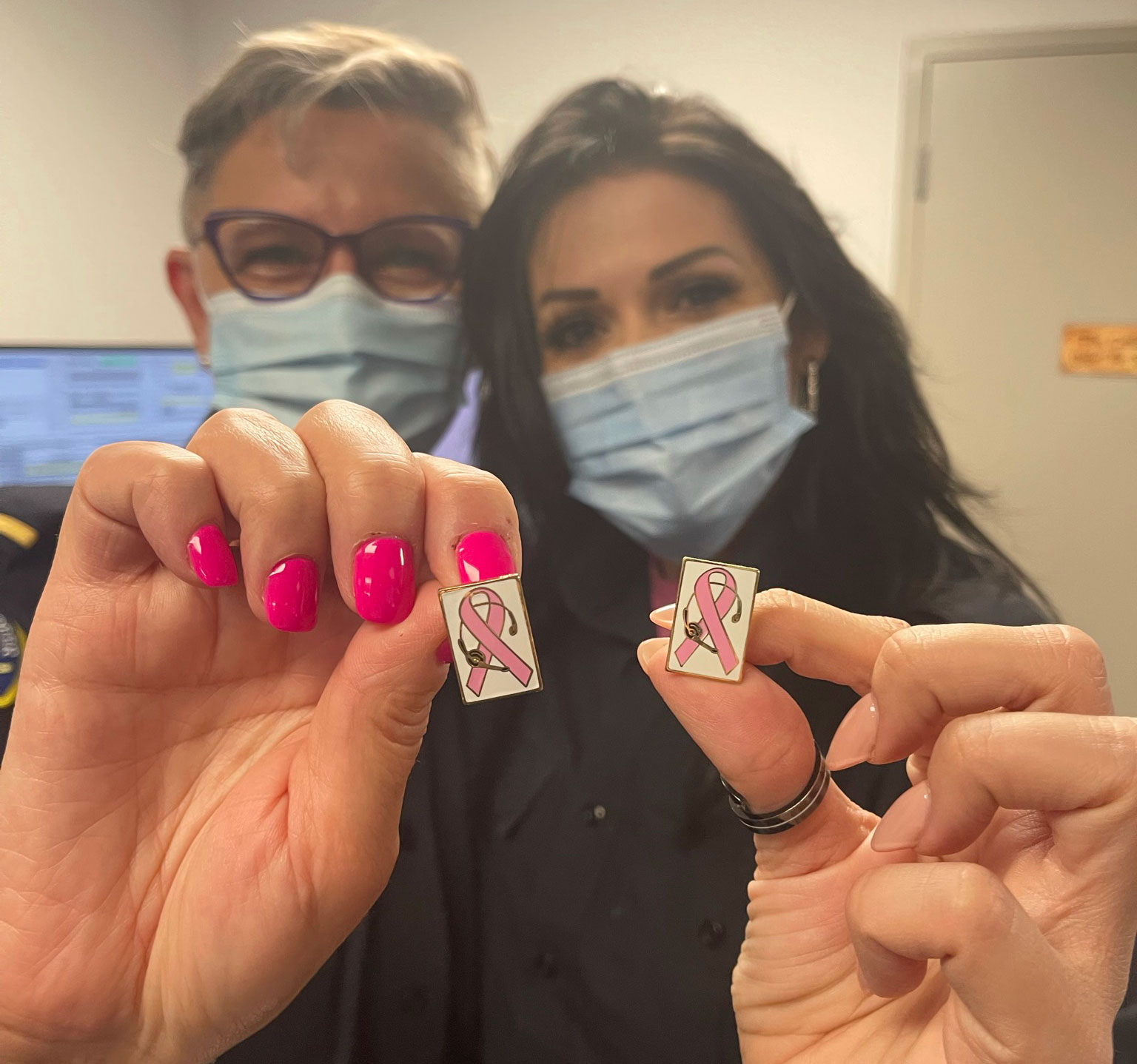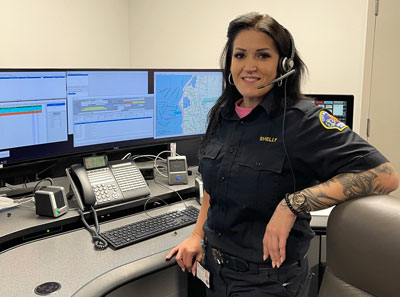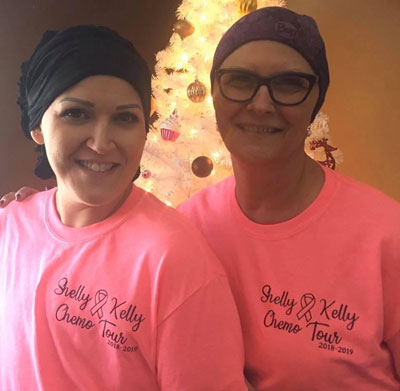Breast Cancer Awareness Month
October 16, 2024
Two women’s journeys demonstrates the power of community when facing health challenges.

Shelly’s Story:
Few experiences match the emotional impact of a breast cancer diagnosis. For Shelly, this reality struck when she least expected it. At just 32 years old, with no family history to raise alarms, she was in denial when she felt a lump during a self-examination in February of 2018. She kept a close eye on it, and by June she was worried. Initially, she did not think that it was anything serious as there were no other symptoms except exhaustion and the lump was not presenting as cancer with the tests that were being carried out.
 Because of this, Shelly wants to underscore the importance of self-advocacy and awareness. After discovering the lump she became her own advocate, insisting on further tests despite initial reassurances from doctors that it wasn’t cancer. “If I hadn’t been persistent, who knows what would have happened,” she reflects, emphasizing the need for everyone, both men and women, to perform monthly self-examinations. Awareness can be the difference between early intervention and late-stage treatment. She passionately advises: “Feel it on the First – every month, regardless of family history. It’s like a house fire, everyone thinks it’s not going to happen to me.”
Because of this, Shelly wants to underscore the importance of self-advocacy and awareness. After discovering the lump she became her own advocate, insisting on further tests despite initial reassurances from doctors that it wasn’t cancer. “If I hadn’t been persistent, who knows what would have happened,” she reflects, emphasizing the need for everyone, both men and women, to perform monthly self-examinations. Awareness can be the difference between early intervention and late-stage treatment. She passionately advises: “Feel it on the First – every month, regardless of family history. It’s like a house fire, everyone thinks it’s not going to happen to me.”
Throughout her journey, Shelly found herself surrounded by an unwavering support system. From the day she was diagnosed, her community rallied around her, providing emotional and practical assistance that proved invaluable. “I never felt alone,” she says. It was a co-worker who organized a GoFundMe account to help alleviate financial strain, and people that she barely knew through work offered meals to her family during her treatments. “People care,” she emphasizes, recalling the power of connection during her most vulnerable moments. The City of Red Deer and Red Deer Emergency Services understood the challenges she faced and offered resources that eased her burden. The empathy shown by her coworkers and community members created a safety net that made her feel valued and cared for. “I was genuinely touched that so many people cared,” she says, recognizing the role community support played in her recovery. Support like this was crucial as she navigated the emotional rollercoaster of her diagnosis, treatments, and the physical changes that happen with chemotherapy. “Some days you feel great, like a warrior. And the next day you look in the mirror and you have no hair or eyebrows and you don’t know who you are.”
Telling her young children about her illness required a delicate balance of honesty and reassurance. Shelly approached the conversation thoughtfully, ensuring her little ones understood in an age-appropriate manner. “As long as I made it sound okay and happy, they weren’t too scared,” she explains. By involving her children in the process, Shelly fostered a sense of understanding rather than fear, emphasizing that communication can ease anxiety in families faced with illness.
Shelly underwent a double mastectomy, chemotherapy, and endured eight surgeries in 11 months. This experience resulted in a profound shift in perspective. “I’m different now; how can I not be?” The challenges she faced led to personal growth and a renewed appreciation for life. “I look for more ‘glimmer’ in life. Every positive thing you take in will smother something negative,” she shares, noting how the small moments of joy, simple things like sunlight shining on her face, have become more meaningful.
March of 2024 was a milestone as Shelly celebrated being cancer free for 5 years. Today, Shelly reflects on her journey with gratitude and determination. The overall message she would like shared with others is simple:
“Carry on with your happy days, go look at the sun. Do not put your energy into something that’s not going to feel good. Advocate for your own health, embrace support, and find beauty in the everyday. Professionally, be sure to do something that resonates with your values, do something that you love.”
Kelly’s Story:
Six years ago, on October 3, a routine medical appointment turned into a pivotal moment in Kelly’s life. “A shadow appeared on my mammogram,” she recalls, and while at a retreat in Sylvan Lake she received the call – it was a tumor the size of a golf ball. Many of the women at the retreat were survivors of breast cancer, so right away Kelly appreciated the nurturing environment that a group of female friends can create for each other. She immediately began to slow down and re-evaluate her priorities. “I realized I didn’t always have to be a ‘superstar,’” she reflects.
 With no family history of breast cancer, the diagnosis felt unreal to her. A flurry of appointments followed. “I had to book off work, but the support I received was overwhelming.” Coworkers organized meal plans and began delivering meals daily. Their kindness and the support from her union proved vital for Kelly. People showed up to shovel snow, install a dishwasher for her, even helped with shingles on her roof. Friends stood by her, providing encouragement during the toughest moments. “It was tough for my family, my kids were worried,” she admits. However, she found comfort in the support from work and from an online breast cancer support group. “While each journey is distinct, we share commonalities that bond us together,” she reflects. She was amazed and thankful for everyone’s support.
With no family history of breast cancer, the diagnosis felt unreal to her. A flurry of appointments followed. “I had to book off work, but the support I received was overwhelming.” Coworkers organized meal plans and began delivering meals daily. Their kindness and the support from her union proved vital for Kelly. People showed up to shovel snow, install a dishwasher for her, even helped with shingles on her roof. Friends stood by her, providing encouragement during the toughest moments. “It was tough for my family, my kids were worried,” she admits. However, she found comfort in the support from work and from an online breast cancer support group. “While each journey is distinct, we share commonalities that bond us together,” she reflects. She was amazed and thankful for everyone’s support.
One misconception she encountered was the belief that every breast cancer diagnosis leads to a mastectomy or chemotherapy. She quickly learned that every journey is unique. For her, chemotherapy was essential and she began with eight sessions every three weeks. To her relief, the tumor shrank significantly and the treatments lessened to 7 sessions. It was removed during a lumpectomy and she began daily medication for precaution. One pill a day, every day, for 5 years. Kelly trusted in science and listened to others who have been through similar situations. She also participated in a program offered through the Cross Cancer Clinic in Edmonton for a drug called Neulasta. “I received it 24 hours after each chemotherapy. It contained a protein used to prevent neutropenia, which is a lack of certain white blood cells. The cost of the drug was covered by a program called Victory Assist.” Kelly also pointed out that a young pharmacist at Clearview Shoppers always made her smile and greeted her with “hello beautiful,” which emphasizes how kindness truly makes a difference to people’s lives.
The experience profoundly changed her perspective on life, and her approach to work mellowed, now appreciating the importance of balance. “I’ve learned to be kinder to myself and those around me. Life has become richer and more meaningful.” Kelly cherishes each moment and has deepened her relationship with others.
Her advice to anyone facing a similar journey is simple:
“Listen to your body; be kind to yourself.”
She encourages people to utilize resources like counseling or to consider journaling to process feelings.
